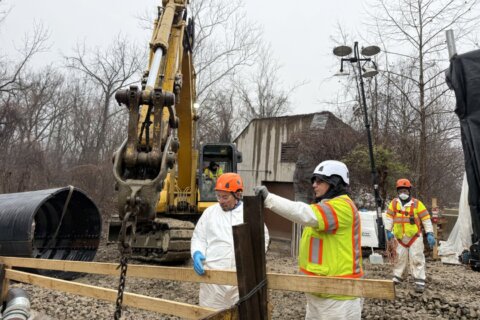Council members in Montgomery County, Maryland, on Tuesday voted to extend the county’s indoor mask mandate through most of February.
At the same time, they put off a vote on a measure that would have required restaurants, bars and fitness centers to check customers’ COVID-19 vaccine cards before they’re allowed to enter the premises.
Under the board of health regulation unanimously approved by the county council Tuesday, the mask mandate for indoor public places is extended to Feb. 21. The mandate was otherwise set to expire next week.
The new order also directs the nine-member Montgomery County Council to meet weekly as the board of health to consider ending the mask mandate earlier if COVID-19 metrics improve.
In particular, the regulation directs council members to consider the number of cases per 100,000 residents in the past seven days; the test positivity rate, and the percentage of hospital beds occupied by COVID patients.
Acting Montgomery County Health Officer James Bridgers told council members that modeling of COVID spread in the county indicates the omicron variant, which has led to a surge of cases and hospitalizations, is expected to fully crest by mid-February.
A draft version of the extension of the mask mandate would have kept it in place through Feb. 28, but an amendment from Council member Andrew Friedson, also unanimously adopted by the council, shortened the end date by a week.
On the matter of the vaccine requirement, the council has held two work sessions and heard testimony from more than two dozen county residents across two days of public hearings — nearly all in opposition — before Council President Gabe Albornoz said the measure had failed to garner enough support to move forward.
“The majority of my colleagues at this point are not prepared to vote on this resolution right now,” Albornoz said ahead of further public testimony Tuesday.
The measure was strongly supported by Montgomery County Executive Marc Elrich, who called it a common-sense measure to reduce the spread of COVID and as a possible way to boost vaccinations in some categories.
However, business groups pushed back on the measure, arguing it wouldn’t have much of an impact on vaccination since nearly 85% of county residents are already fully vaccinated.
In one of the public hearings Tuesday, all 18 public speakers spoke in opposition to the measure, saying it would block unvaccinated people from participating in public life — including children under 5 — and could harm small businesses.
- Prince George’s Co. announces pickup locations for COVID-19 tests
- Fairfax Co. students without masks to be excluded from in-person learning
- Latest COVID-19 cases, deaths and hospitalizations in the DC region
Council member Craig Rice said he was troubled by some of the public testimony, but said it indicated that “we are at an impasse at a place where those who have chosen to get vaccinated have chosen to do so. And the remainder of our community who chooses not so are not going to be convinced.”
He said individual members of the community should convince neighbors, friends and family members who haven’t yet gotten vaccinated.
“We’re not going to be able, as government, to force anybody to do it or convince them or coerce them,” Rice said. “It’s up to us as individual members of our community and society to work with one another who we care about and love, to tell them about the benefits and hope they make the right decision. That’s where we are.”
After the proposal was essentially shelved, most council members signaled their opposition should it have been taken up for a vote.
“This would be absolutely unfair for any business, especially a small business,” said Council Member Sidney Katz said of the vaccine requirement.
As written, the regulations would have required businesses to essentially hire vaccine card “bouncers” to screen customers, some business groups testified.
“Bottom line on this is that this is not going to solve the problem that it was suggested that it would solve,” Katz said. “We are not going to get, in my opinion, any significant increase in vaccination numbers.”
At-Large Council Member Hans Riemer said he would like to see a “more workable version” of the vaccine requirement, citing a recent trip New York City, which rolled out a vaccine passport measure last summer.
“I think that there is a way to do it but you can’t treat the business community like an afterthought,” Riemer said. “And you’ve got to work with them on a way to do it that actually can be implemented and addresses some of these concerns.”








